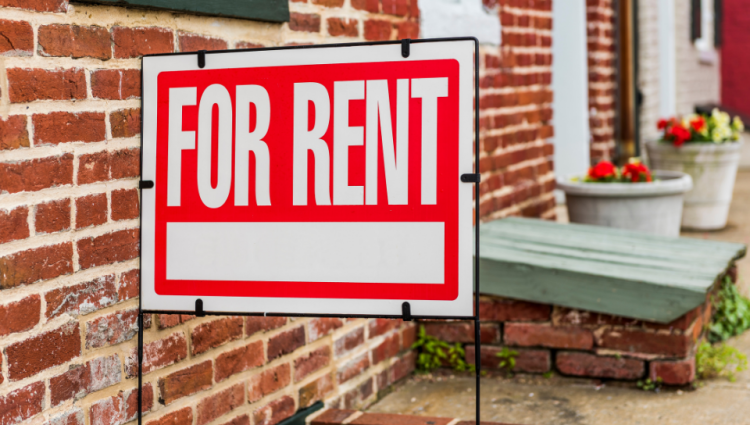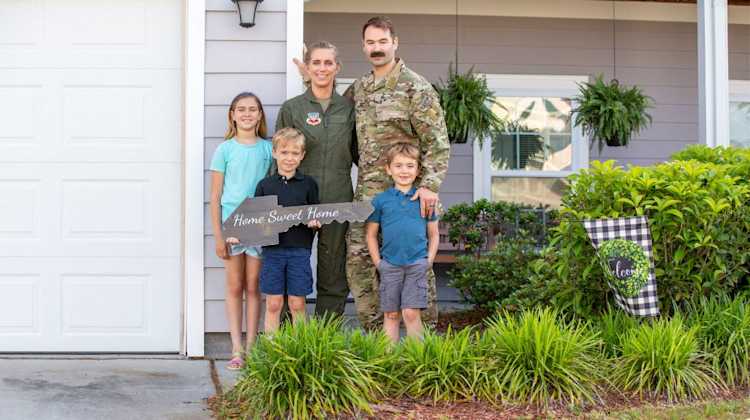Things to Know Before Renting Off Base
by Bobbi Pack - September 28th, 2021

You decided that this time around you don’t want to live on the military installation, so you have made the decision to rent from a civilian company or landlord. Totally understandable! There are many military families who choose this route; in fact, we did several times. I don’t want to scare or overwhelm you, but there are a few things you need to keep in mind when renting off base.
Finding a home
There are a ton of places to look when you are trying to find that perfect home. We always start with PCSgrades, similar to Angie’s List but exclusively for the military and veteran community. It’s great to really get a feel for a specific area by reading neighborhood reviews written by fellow military families. We also turn to hotpads.com for house and apartment listings.
When you find your perfect home
It’s so important to visit a property in person. This is much easier to arrange when you are renting than when you are buying a home, because there is a shorter turn-around time. You may be able to do it on “house-hunting” leave before or immediately after your move. My number one tip: Do a walk through! Look carefully around the home to see if there is any damage. You do not want to get stuck paying for damage you did not cause. Make sure you take photos of what the property looked like when you moved in, and note everything on the move-in sheet. And I do mean everything!
Look over the lease
Make sure you look over the lease with a fine-tooth comb. You need to make sure you fully understand what you’re getting into. If there is something you do not understand, ASK! If the landlord doesn’t want to explain it to you… RED FLAG! Do not sign on the dotted line until you completely understand the terms on the lease 100%. If there is any chance whatsoever that you might be moving again before the end of the lease, pay special attention to early termination terms. When renting off base, most landlords will have something in their lease regarding early termination for military requirements. The SCRA does allow service members on orders to get out of a lease without penalty fees, but that doesn’t mean it will happen without hassle. Better to ask first and know the details so you can be prepared.
Get it in writing!
You do not want to be stuck in a situation at the end of your lease where it’s a ‘he said/she said’ situation. If there is something you both agree on, but it’s not in the lease, get it in writing and get it notarized. For example: if your landlord is going to be responsible for the trash and recycle costs every month, or they will be responsible for snow removal in winter, and this is something you both agree on, get it in writing. If it is not in your lease, add an addendum or type something up, then go to the bank with the landlord and have it notarized.
Security Deposits
Believe it or not, you do have rights. When it comes to security deposits, you need to make sure you fully understand the terms regarding what your deposit will and will not be used for. I have always asked for this to be in writing. I want my entire security deposit back if the property is returned in the exact condition I received it in, and so should you! Thanks to my habit of taking tons of photos and notes (sometimes I even video things) I have a solid track record of getting back my deposit.
Handling Repairs
Yes, I know it’s a HUGE bummer but odds are when you are living in the home it will need repairs from time to time. As a tenant, you need to know your rights when it comes to repairs too. If it states in your contract that the landlord is to fix all issues with the home, within a specific amount of time, then they have to do so. In many states, you can actually hold off paying rent until the repairs are completed. But, please do your research before you do this as laws vary from state to state.
Communication is Key
Make sure you are communicating with your landlord. If there is a problem, let the landlord know. Its like the old saying, ‘no news is good news’. If they don’t here from you, they probably assume that everything is good. So, if there is something wrong… even if you think it’s small, let the landlord know.
Renter's Insurance
This is a no brainer, but you would be surprised by how many neglect to purchase renter’s insurance. Your landlord’s property insurance does not cover your personal belongings or furniture. It’s not that much and it can save you from so many headaches. It can cover your items in a fire, flood, theft, etc., and typically isn’t that expensive for a $50K policy. Coverage lower than $50K will of course be even cheaper. Renters policies may vary.
Security
Make sure you ask the landlord if they changed the locks from the last tenants. You need to feel safe. Honestly, I always ask if we can add a chain to the door and none of our past landlords had ever said no. Also, I ask for copies of the receipts showing the locks were in fact changed. Safety first… ALWAYS!
PCSing...again!
When it is time for you to leave the property, makes sure you give the landlord at least 30 days notice. They will need to find a new tenant to replace you. If you cannot give them 30 days notice due to your orders, show them your orders, and they should allow you to get out of the lease. If you are anything like me, you will want that security deposit back. So try and stay on good terms with the landlord through the entire process. You may even want to use them as a reference at your next duty station.
No matter what you choose… just remember to be smart when deciding where you are going to live. Do your research. PCSing is hard and you don’t want or need any added stress.








